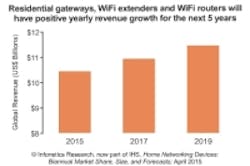Report: Multiscreen TVs powering Wi-Fi extender market
IHS/Infonetics Research (NYSE: IHS) reports that unit shipments of Wi-Fi extenders, which are used to improve the range of Wi-Fi networks, will hit 9.6 billion worldwide in 2019, up from 5.3 million in 2014.
“We look for shipments of WiFi extenders to grow worldwide over the next several years, especially in North America and EMEA, where there are higher percentages of larger homes or older homes with cinderblock walls that tend to block or weaken Wi-Fi signals,” explains Jeff Heynen, research director for broadband access and pay TV at IHS.
He adds, “Service providers will increasingly rely on multiscreen video to differentiate their broadband and pay TV services, and customers will expect these services to work consistently, posing a technical challenge given the variability of Wi-Fi signals."
The 2015 IHS Infonetics Home Networking Devices report tracks broadband routers; residential gateways; set-top boxes (STBs); multimedia over coax (MoCA) optical network terminals (ONTs); WiFi broadband routers and extenders; and HomePlug Powerline, MoCA coax Ethernet and HPNA/G.hn adapters. Published biannually, the report provides worldwide and regional market size, vendor market share, forecasts through 2019, analysis and trends.
According to the report, the home networking device market came to $12.6 billion in 2014, an 8 percent increase over 2013. The research states that, in 2014, 802.11ac routers comprised 16 percent of all Wi-Fi router shipments, soaring 744 percent year-over-year. The analyst sees the breakdown of Wi-Fi router shipments moving further in favor of 802.11ac routers, which are forecast to make up roughly 86 percent of all shipments by 2019.
Vendors tracked by the report include Actiontec, Alcatel Lucent, Arris, AVM, Belkin, Cisco, Comtrend, Devolo, D-Link, Fiberhome, Hitron, Huawei, Netgear, Pace, Sagemcom, SMC Networks, Technicolor, TP-Link, TrendNet, Ubee Interactive, ZTE, ZyXel and others.
